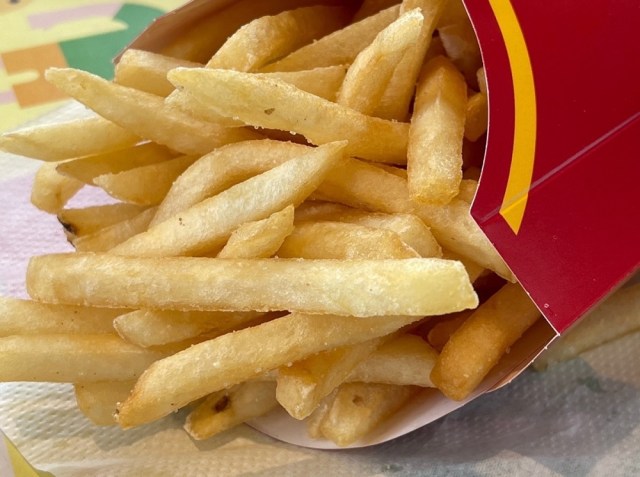
A golden ray of salty hope shines from across the Pacific.
December 21 was a dark day in Japan, and not just because, as the winter solstice, it marked the low point of daylight hours. There was also an emotional darkness clouding the nation’s hearts, as on that day, McDonald’s Japan announced its decision to suspend sales of medium and large-size orders of French fries at its restaurants across the country.
For the last two years, whenever we’re deprived a source of joy, we’re quick to assume the coronavirus is to blame, and indeed, pandemic-related disruptions of the supply chain are part of the problem. The potatoes McDonald’s Japan uses for its fries are grown in the U.S. and shipped via Canadian ports, and a three-nation voyage is a difficult thing to coordinate in the current health climate. Monthlong flooding in Canada’s British Columbia, which includes Vancouver and its spud-shipping port, was also a major factor.
Eventually, the anguished cries of fry fans grew loud enough that they were heard by American businessman Ryan Peterson, who tweeted about the situation on December 23, one day before McDonald’s was halting sales of everything but small-size fry orders.
One of the fun things about working at Flexport is that for any company in the world you want to learn about, someone at Flexport understands their operations at an incredibly granular level. This morning I'm learning about McDonald's french fry shortages in Japan...
— Ryan Petersen (@typesfast) December 22, 2021
Peterson isn’t just any businessman, though. He’s the CEO of San Francisco-based international freight forwarding/customers brokering company Flexport, which puts him in a unique position to help find a solution to Japan’s potato problem. Six days later came a follow-up announcement that Flexport will be flying three 747 loaded with potatoes to Japan to help the country cope with the crisis.
Update: @Flexport just contracted to fly three 747 loads of potatoes to Japan to help with the French fry shortage.
— Ryan Petersen (@typesfast) December 29, 2021
Peterson, with tongue in cheek, joked that there had been some internal debate as to whether or not the influx of French fry ingredients should be handled by Flexport’s division that manages humanitarian relief efforts, while explaining that the potato planes are, in fact, part of Flexport’s for-profit operations.
In regard to the efficiency of shipping vegetables by air mail, Peterson explained that the planes were otherwise scheduled to make empty return flights to Japan. So rather than have them fly across the Pacific with their cargo holds empty, filling them up with something the country is undergoing a shortage of seemed like the better idea.
As for how many large-size orders of fries those potatoes can be used to make, one commenter did the conversion and came up with 2.2 million orders.
A 747 can carry about 112,760 kgs, and a serving of large fries at McDonalds is about 154g. About 2.2 Million servings if anyone is wondering. https://t.co/YcVehRD1Lu
— Gyanendra Mishra (@_gyani_) December 29, 2021
It should be pointed out that at the same time that McDonald’s Japan announced the suspension of large and medium fry sales on December 21, the fast food chain also promised that sales of those sizes would be resuming on December 31, and no change to that timeline has been made. McDonald’s Japan has also not made any public statement that it is the recipient of the Flexport potatoes, especially considering that Peterson’s first tweet about Japan’s potato shortage not appearing until December 23, Flexport may or may not be the specific spud savior responsible for putting medium and large fries back on the McDonald’s Japan menu. On the other hand, Peterson not talking about the situation until the 23rd doesn’t preclude the possibility that someone else at Flexport was already taking point on the deal before the CEO’s involvement in the project and initial tweet.
In any case, a secured buyer seems like it’d be a prerequisite for those potatoes to be flying to Japan, so odds are they’ll be frying, either at McDonald’s or another restaurant, very soon.
Source: Twitter/@typesfast (1, 2, 3) via Bloomberg Japan via Golden Times, McDonald’s Japan
Photo ©SoraNews24
● Want to hear about SoraNews24’s latest articles as soon as they’re published? Follow us on Facebook and Twitter!






No hay comentarios:
Publicar un comentario